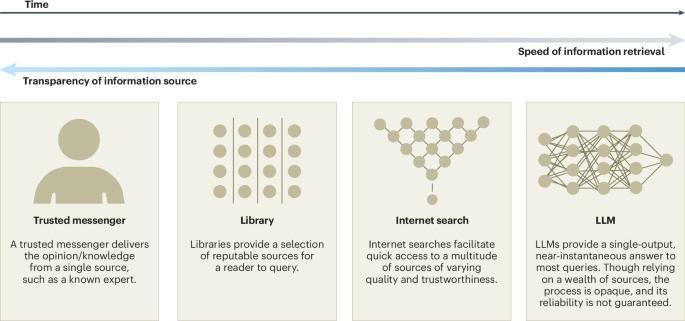大型语言模型如何重塑集体智慧。
IF 21.4
1区 心理学
Q1 MULTIDISCIPLINARY SCIENCES
引用次数: 0
摘要
集体智慧是群体、组织、市场和社会成功的基础。通过分布式认知和协调,集体可以取得超越个人能力(甚至是专家能力)的成果,从而提高准确性和创新能力。通常情况下,集体智慧得到信息技术的支持,例如能够激发 "群众智慧 "的在线预测市场、组织集体讨论的在线论坛或从公众中收集知识的数字平台。然而,大型语言模型正在改变信息的聚合、获取和在线传输方式。在此,我们将重点关注这一转变给集体智慧带来的独特机遇和挑战。我们汇集了来自产业界和学术界的跨学科观点,以确定潜在的利益、风险、与政策相关的考虑因素和开放式研究问题,最终呼吁对大型语言模型如何影响人类集体解决复杂问题的能力进行更深入的研究。本文章由计算机程序翻译,如有差异,请以英文原文为准。

How large language models can reshape collective intelligence
Collective intelligence underpins the success of groups, organizations, markets and societies. Through distributed cognition and coordination, collectives can achieve outcomes that exceed the capabilities of individuals—even experts—resulting in improved accuracy and novel capabilities. Often, collective intelligence is supported by information technology, such as online prediction markets that elicit the ‘wisdom of crowds’, online forums that structure collective deliberation or digital platforms that crowdsource knowledge from the public. Large language models, however, are transforming how information is aggregated, accessed and transmitted online. Here we focus on the unique opportunities and challenges this transformation poses for collective intelligence. We bring together interdisciplinary perspectives from industry and academia to identify potential benefits, risks, policy-relevant considerations and open research questions, culminating in a call for a closer examination of how large language models affect humans’ ability to collectively tackle complex problems. Collective intelligence is the basis for group success and is frequently supported by information technology. Burton et al. argue that large language models are transforming information access and transmission, presenting both opportunities and challenges for collective intelligence.
求助全文
通过发布文献求助,成功后即可免费获取论文全文。
去求助
来源期刊

Nature Human Behaviour
Psychology-Social Psychology
CiteScore
36.80
自引率
1.00%
发文量
227
期刊介绍:
Nature Human Behaviour is a journal that focuses on publishing research of outstanding significance into any aspect of human behavior.The research can cover various areas such as psychological, biological, and social bases of human behavior.It also includes the study of origins, development, and disorders related to human behavior.The primary aim of the journal is to increase the visibility of research in the field and enhance its societal reach and impact.
 求助内容:
求助内容: 应助结果提醒方式:
应助结果提醒方式:


